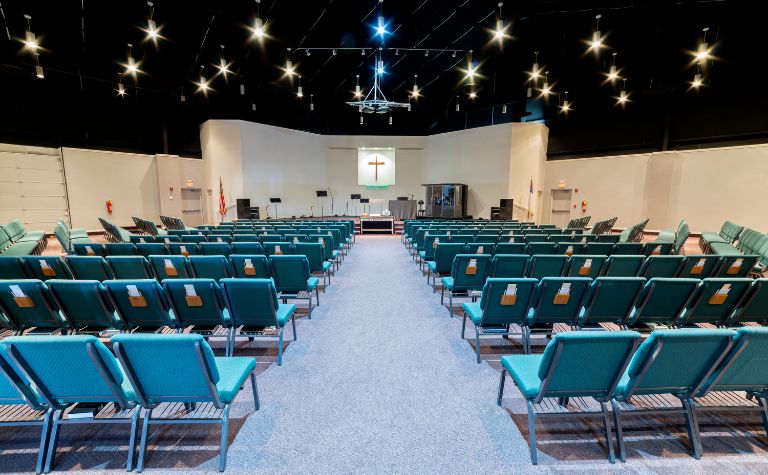The Assemblies of God and the Foursquare church are two of the largest and most influential Pentecostal denominations in the world today. From their early 20th-century origins to several core theological doctrines, these two traditions have a lot in common, yet they have important differences, too.
The Assemblies of God and Foursquare church are both Protestant, evangelical, Pentecostal Christian denominations that emphasize baptism in the Holy Spirit, speaking in tongues, and divine healing. The biggest differences between them are the doctrine of perfection and their forms of church government.
What are the similarities and differences between the Assemblies of God and the Foursquare church when it comes to their origins, founders, organization, and membership size? Do they believe the same about God, Scripture, the Holy Spirit, and the end times? Keep reading to learn more.
Also, see Pentecostalism vs. the Charismatic Movement: Comparison to learn more.

Assemblies of God vs. Foursquare Churches Comparison
The Assemblies of God denomination is approximately eight years older than the Foursquare church. Both trace their history to the Azusa Street Revival (1906-1915) in Los Angeles, California, and to Bethel Bible College before that. Though the denominations have similar origins and theology, there are differences between them. (Also see Assemblies of God vs. Pentecostal: What’s the Difference?)
| OVERVIEW | Assemblies of God | Foursquare Churches |
|---|---|---|
| Origin | Pentecostal pastors and leaders had strong convictions that speaking in tongues was evidence of a post-conversion baptism of the Holy Spirit, organized in Hot Springs, Arkansas, in 1914. | Aimee Semple McPherson (1890-1944), a Canadian Pentecostal evangelist, started the Foursquare Church in 1922 and led the denomination until her death. |
| Early influencer(s) | Charles Fox Parham (1873-1929), Agnes Ozman (1870–1937), William Joseph Seymour (1870-1922) | Aimee’s son, Rolf K. McPherson, took over the leadership of the denomination when she died. |
| Meaning of name | “Assemblies” refers to individual churches. “God” refers to the denomination’s beliefs about God as he is revealed in the Bible. | The name “Foursquare” comes from McPherson’s interpretation of the first chapter of the book of Ezekiel. The four creatures mentioned (e.g., lion) correspond to four offices Christ had (e.g., king). The name reflects the Christ-centered interpretation of Ezekiel 1. |
| Significant writing outside the Bible | The 16 Fundamental Truths is the name of the denomination’s belief statement. | McPherson’s longer and shorter doctrinal statements: “Declaration of Faith of the International Church of the Foursquare Gospel” and “Creedal Statements of the International Church of the Foursquare Gospel.” The latter is a concise summary of the former. |
| Organization | Assemblies of God churches are organized according to presbyterian polity (though not theology) at the national level as well as the regional or district level. Individual churches, however, are self-governing. | The Foursquare denomination isn’t congregational. Local churches aren’t autonomous in relation to the denomination, though they are in regard to the government. The denomination’s form of government is closest to Episcopalian, which is rooted in McPherson’s leadership model of having the final say in all matters. |
| OVERVIEW | Assemblies of God | Foursquare Churches |
|---|---|---|
| Divisions | The Assemblies of God has been free of significant splits. The internal debate has occurred over a number of issues, but the denomination has avoided large protesting factions. | The Foursquare Church hasn’t experienced any significant splits in its 100-year existence. |
| Theological and Social worldview | The Assemblies of God is evangelical. It’s conservative on theological and social issues. The denomination ordains women to be pastors, which some Christians consider liberal and progressive. | The Foursquare Church is generally conservative on theological and social issues. Like the Assemblies of God, the denomination ordains women, which some Christian traditions consider modern and progressive. |
| Membership | 69 million members globally | 8.6 million members globally |
| Website | ag.org | foursquare.org |
Also see Assemblies of God vs. Methodist: What’s the Difference?

Assemblies of God vs. Foursquare Beliefs, Theology, and Doctrine
The theology of the Assemblies of God and the Foursquare church are similar. In relation to other denominations, they are nearly identical. (Also see Why Did Bethel Church Leave the Assemblies of God?)
The most significant similarities are in regard to the core beliefs of Christianity, like the Trinity and the inspiration of Scripture. The most significant commonality on other doctrines is their shared belief that baptism in the Holy Spirit occurs after conversion and that speaking in tongues is the evidence for it.
The doctrinal statement for the Assemblies of God is called The 16 Fundamental Truths (see above). The theological descriptions below from the Foursquare church come from a document called the Simplified Guide to Foursquare Beliefs. [1] Readers are encouraged to consult both statements for more information.
| BELIEFS | Assemblies of God | Foursquare Churches |
|---|---|---|
| Theology (general) | Assemblies of God is Protestant. They believe that salvation is by grace through faith in Christ alone and not according to works. | Foursquare churches are Protestant. They have the same beliefs as the Assemblies of God about salvation, grace, and faith. |
| Theology (specific) | Assemblies of God is Arminian. Within the framework of Arminianism, their belief systems is often referred to as “Pentecostal theology.” | Foursquare churches are Arminian. Like the Assemblies of God, they subscribe to Pentecostal theology. |
| God | Trinitarian. There is one God who exists in three persons. | “We believe that God is Triune: Father, Son and Holy Spirit (2 Cor. 13:14).” |
| Jesus | Jesus is the second person of the Trinity. He is God in human flesh. He is 100% God and 100% man. Jesus was born of a virgin, lived a sinless life, died as an atonement for sin, and was physically resurrection on the third day. | Same |
| Is the Holy Spirit God? | The Holy Spirit is the third person of the Trinity. He is fully divine. The Spirit applies the salvation that the Father planned and that the Son earned for sinners. He bestows spiritual gifts on believers that they are to use for the edification of the Church. | Same |

| BELIEFS | Assemblies of God | Foursquare Churches |
|---|---|---|
| Speaking in tongues | The Assemblies of God believes that speaking in tongues is the initial evidence of baptism in the Holy Spirit, which they believe occurs after conversion. | Same |
| The Bible | #1 of The 16 Fundamental Truths state, “The Scriptures, both the Old and New Testaments, are verbally inspired of God and are the revelation of God to man, the infallible, authoritative rule of faith and conduct.” | “We believe that the Bible is God-inspired (2 Tim. 3:16, 17).” |
| Sin | #4 of The 16 Fundamental Truths state: “Man by voluntary transgression fell and thereby incurred not only physical death but also spiritual death, which is separation from God.” This is also referred to as the doctrine of Original Sin. | “We believe that man is created in the image of God but, by voluntary disobedience, fell from perfection thereby imbuing humanity with sinfulness (Rom. 5:12).” |
| Atonement | Assemblies of God believes in the penal-substitutionary atonement of Christ. His death was the punishment for sin, and he took the place of sinners on the cross. Assemblies of God believes the application of the atonement occurs within the framework of Arminian theology. | “We believe that, while we were sinners, Christ died for us—pardoning all who believe in Him (John 3:16; Rom. 5:8).” |
| Salvation | #5 of The 16 Fundamental Truths state, “Salvation is received through repentance toward God and faith toward the Lord Jesus Christ. By the washing of regeneration and renewing of the Holy Spirit, being justified by grace through faith, man becomes an heir of God, according to the hope of eternal life.” | “We believe that we receive salvation when we come to God through faith in the atoning work of Jesus on the cross. Salvation is God’s gift to us (Eph. 2:8).” |
| BELIEFS | Assemblies of God | Foursquare Churches |
|---|---|---|
| Perfectionism | Assemblies of God doesn’t believe in the doctrine of perfection, which states that believers can grow to a state of sinlessness in this lifetime. | The Foursquare church believes in the doctrine of perfection. Non-perfectionist traditions believe that sanctification is perfected at death for the believer. |
| Spiritual gifts | Assemblies of God believes that all spiritual gifts mentioned in the Bible are operational today, including speaking in tongues, divine healing, and miracles. | “We believe that the Holy Spirit has gifts to bestow upon Christians (1 Cor. 12:1-11) and that we should show spiritual fruit as evidence of a Spirit-filled life (Gal. 5:22-25).” |
| Water Baptism | Sometimes referred to as “credobaptism” (credo = “I believe”), water baptism is for professing believers who have trusted Christ for salvation. The doctrine is often called “Believer’s Baptism.” Baptism isn’t necessary for salvation. | “We believe that baptism by immersion in water is an outward sign of an inward work (Matt. 28:19; Rom. 6:4).” The Foursquare church practices “Believer’s Baptism” as well. |
| The Lord’s Supper | #6 of The 16 Fundamental Truths state, “The Lord’s Supper, consisting of the elements — bread and the fruit of the vine — is the symbol expressing our sharing the divine nature of our Lord Jesus Christ, a memorial of his suffering and death, and a prophecy of His second coming, and is enjoined on all believers ’till He comes!'” | “We believe in commemorating the Lord’s Supper by the symbolic use of bread and fruit of the vine (1 Cor. 11:24, 25).” |
| Eschatology | Premillennial, pre-tribulation rapture of the Church. #14 of The 16 Fundamental Truths state, “The second coming of Christ includes the rapture of the saints, which is our blessed hope, followed by the visible return of Christ with His saints to reign on earth for one thousand years.” | Premillennial, pre-tribulation rapture of the Church. It believes in the Second of Christ. “We believe that the second coming of Christ is personal and imminent (1 Thess. 4:16, 17; Titus 2:11-13).” |
Also see Assemblies of God vs. Non-Denominational: What’s the Difference?
Please see the related articles below.
References:
[1] Source
[2] Source
[3] Source
Related Questions
The Assemblies of God and Baptist traditions are sizable and significant branches of Protestant Christianity. They each have a fascinating history in Europe, America, and as of the twenty-first...
The Assemblies of God and the Church of God (Cleveland, Tennessee) are two of the oldest Pentecostal denominations in the world. There is a lot that unites these Protestant-Christian traditions, yet...
